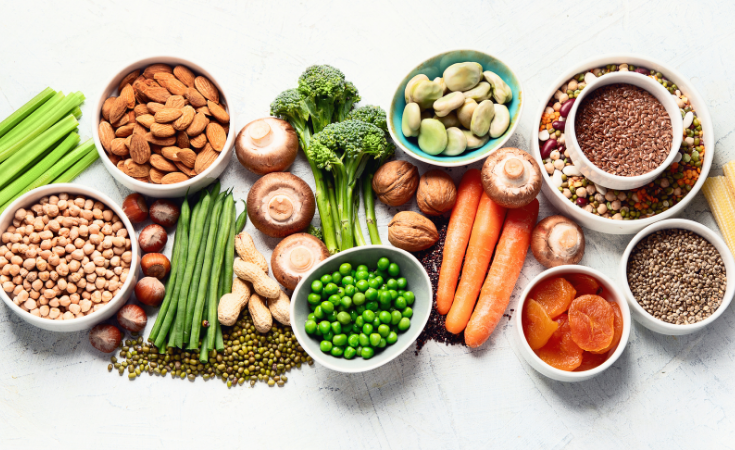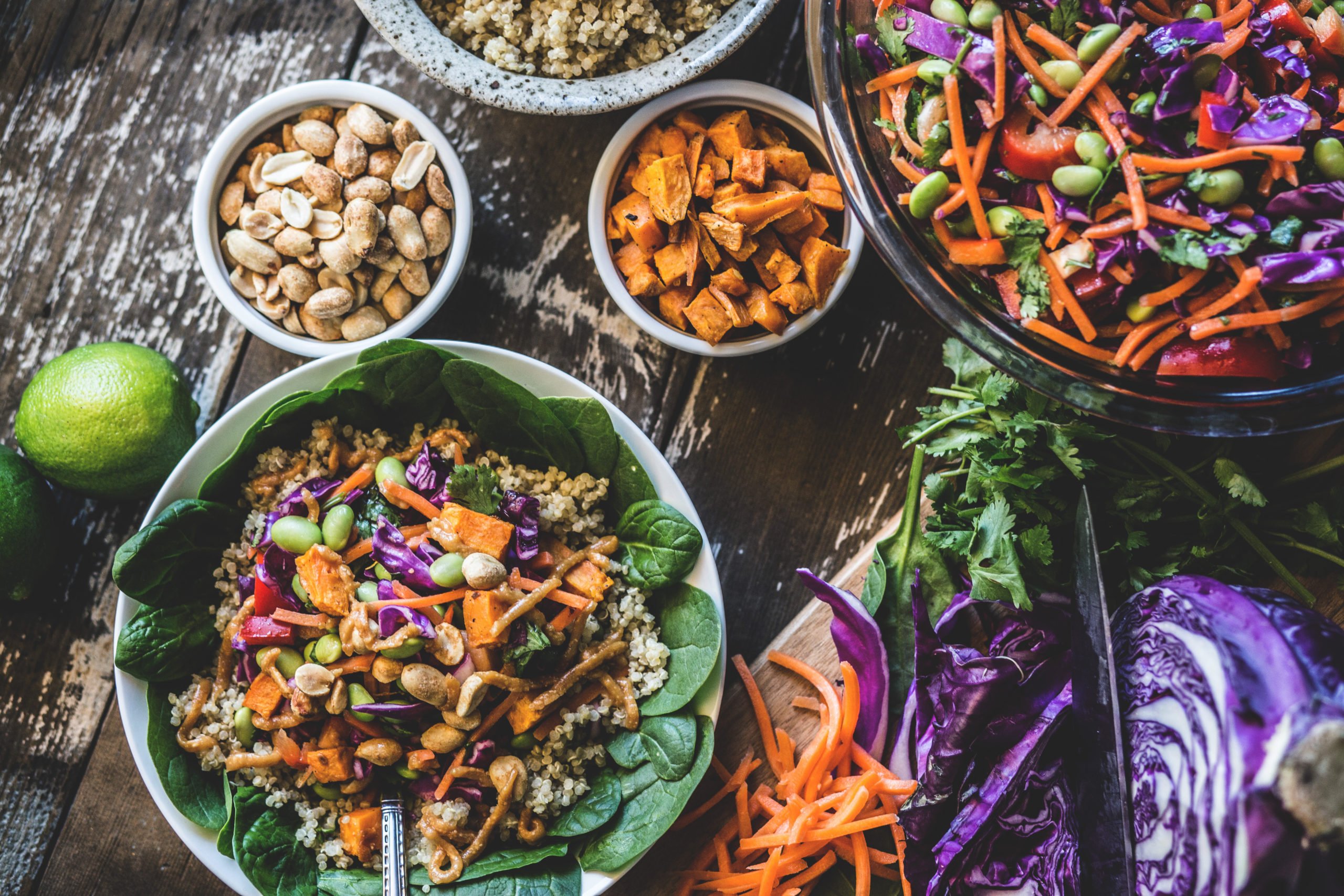When referencing high protein foods, we generally tend to think about meat, like chicken breast or lean beef. But what if you’re a vegan, vegetarian, or simply trying to eat fewer animal products? There are many vegetarian protein options that provide the same, if not more, benefits as meat-based protein.
Whether you’re vegetarian or not, anyone can benefit from the healthy and filling protein that plants can provide. If you’ve ever wondered about plant-based protein, or are even just a little bit curious, this article will break down what it is, why you need it, and how it provides a healthy alternative to those looking to reduce their animal product intake.
What Is Plant-Based Protein?
To put it simply, plant-based protein is protein derived from plants. There are plenty of ways to meet your daily protein goals by eating plant-based foods. From tofu to chickpeas, there are so many ways to incorporate plant-based protein into your diet, and you don’t have to go completely vegetarian to do so. If you’re simply looking to eat less meat, try starting with meatless Mondays using the list of plant-based high protein foods below, or pick a few days of the week to ixnay any animal products.
A common concern amongst those thinking of introducing vegetarian protein sources into their regimen, is that they lack sufficient amounts of protein needed for a healthy diet. While this may be true for certain plant foods, the list provided below will give you plenty of options that fulfill anyone’s protein requirements. In fact, many health experts agree vegan or vegetarian diets provide all of the nutrients people need. (1)
Plant protein vs animal protein
Let’s start with why protein is so important in the first place. Protein is found all throughout your body, in fact, it makes up 20% of it! It helps us build and maintain our tissues, hormones, and immune system, and is an essential building block of our bones, muscles, skin, blood, and cartilage. (2) The kicker? Your body doesn’t store protein, so it’s important to get enough of it through your diet each and every day.
When it comes to high protein foods, plant protein and animal protein differ. This is because of their amino acid contents. Amino acids are the building blocks of protein, and what your body breaks turns digested protein into once it’s entered your digestive system. Animal protein sources like meat, dairy, and fish are considered to be complete proteins because they contain all of the essential amino acids our body needs to function properly.
Animal protein foods are also high in several nutrients that vegetarian protein sources might be lacking, including vitamin D, vitamin B12, DHA, and zinc. However, animal products contain saturated fat, high levels of cholesterol, and have been associated with heart and cardiovascular disease. (3)
Certain vegetarian protein options are considered to be incomplete, because they lack one or more of the essential amino acids. (4) With that being said, some plant-based foods contain nutrients and antioxidants that animal protein does not, along with important fiber, and a reduced risk of disease. (5)

Complete protein vs incomplete protein
So, what is the best type of protein? In this case, there is no specific winner, because it truly depends on the type of results you’re looking for. If you’re looking for high protein foods to improve overall health, a combination of the two covers most dietary needs. If you’re looking for high protein foods to build muscle, vegetarian protein sources may be easier for the body to break down and absorb, while whey protein, which includes dairy, can have the same effect. (6)
Okay, it may seem like there’s no direct answer, and a few years ago, that may have been true. This is because until now, we have put a lot of importance on complete vs. incomplete protein, complete usually getting the upper hand.
But new research suggests that it might not be as big of a deal as we thought. Why? Well, for the most part, vegetarian protein options are typically only missing one or two essential amino acids. This is an easy fix. Different vegetarian protein sources are lacking in different amino acids. So, by combining various plant-based proteins, you get a complete amino acid profile. (7)
How Much Protein Do I Need?
The Recommended Dietary Allowance is 0.8 grams of protein per kilogram of body weight. (8) Keep in mind that this number is only the minimum amount you need in order to meet your basic nutritional requirements to survive. In general, people tend to eat a lot more protein than the minimum requirement, which is good in the eyes of most health and nutritional experts.
The amount of protein you specifically need depends on the results you are looking for. If you’re looking to lose weight, consuming 25-30% of your calories from protein has been shown to boost metabolism. (9) If you want to build muscle with high protein foods, 1 gram of protein per pound of bodyweight is a good starting point. (10)
If you want to learn more, check out this blog post to learn about calculating your protein intake.

Types Of Plant-Based High Protein Foods
Vegetarian protein sources can be made in a variety of ways to keep your diet fun, exciting, and of course, healthy!
- Quinoa—This high-protein food is one of my favorites because it is a complete protein source. One cup of cooked quinoa has about 8 grams of protein, and is also loaded with magnesium, iron, and fiber. (11)
- Tofu, tempeh, or edamame—All of these are made from soybeans and are also complete sources of protein. They can be tossed in a variety of different dishes to spice up your meals.
- Amaranth—Another complete protein source, amaranth is a great gluten-free grain alternative. It can be boiled for a side dish similar to porridge, or added to your salads for an extra crunch.
- Ezekiel bread—This one is a great bread alternative if you’re looking to go low-carb. Ezekiel bread is made from sprouted whole grains and legumes, and two slices contain 8 grains of protein.
- Spirulina—This is a type of blue-green algae, and in powder form is a great, easy addition to your smoothies, soups, or salads for an extra boost of nutrition.
- Chia seeds—Chia seeds absorb liquid to form a gel-like substance, making them a fun addition to smoothies. Think boba tea, in smaller form. 28 grams of chia seeds contains 4 grams of protein, plus iron, calcium, and omega-3. (12)
- Rice and beansıBoth complete proteins, rice and beans are a great protein source because they go with just about anything!
- Hummus and pita bread—When combined, hummus and pita give you all nine essential amino acids, making them complete protein sources for the perfect snack!
- Lentils—Lentils provide 18 grams of protein in each cooked cup (13), and can be easily added to your favorite soups or salads.
- Chickpeas—Another legume favorite, chickpeas are a great vegetarian protein source. Check out this blog for an awesome chickpea soup recipe!
- Hemp seed—Hemp seed is a complete protein source, and is also a great source of magnesium, iron, calcium, and zinc. (14)
- Oatmeal—A delicious morning pick-me-up, oatmeal is an easy way to add protein to your diet.
- High-protein veggies—What better way to get your high protein foods in than with some greens! Veggies containing the highest amounts of protein include broccoli, spinach, asparagus, sweet potatoes, and brussel sprouts.
The Bottom Line
Whether you’re looking to go full vegan, or just want to get good protein into your diet without turning to animal sources each time, these vegetarian protein options are a great start. Each and every one of these high protein foods can be made in a variety of ways, so you never get bored with eating healthy!